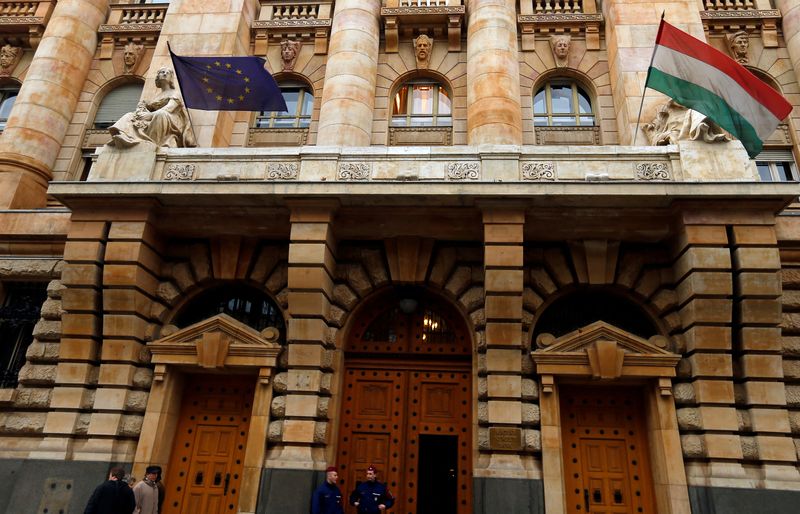
FILE PHOTO: A view of the entrance to the National Bank of Hungary building in Budapest,Hungary February 9, 2016. REUTERS/Laszlo Balogh/File Photo/File Photo
December 23, 2021
BUDAPEST (Reuters) – Hungary’s central bank raised interest rates again on Thursday to combat surging inflation, although some analysts said a move by Prime Minister Viktor Orban’s government to cap retail mortgage interest rates could undermine its efforts.
The National Bank of Hungary (NBH) raised its one-week deposit rate by 20 basis points to 3.8% at a tender on Thursday, extending a series of weekly interest rate hikes as it tries to curb rising inflation.
But on Wednesday Orban had said the government would freeze retail mortgage interest rates for a six-month period from January to shield households from higher borrowing costs.
The bank had raised its base rate by 30 basis points to 2.4% last week, its highest level since May 2014, and pledged further rate hikes next year to anchor rising inflation expectations.
The one-week deposit rate, which the bank uses to tackle short-term market volatility, now sits 305 basis points above its June level, when the bank started tightening policy, a move also reflected by Budapest interbank rates.
The mortgage rate cap and the size of the rate increase, which disappointed some investors, helped to push the forint down 0.3% on the day, putting it within sight of its all-time-lows at 372 per euro hit in November.
“Announcements of PM Orban on the freezing of mortgage rates at their October levels at least until June could considerably undermine efforts … to tighten monetary conditions,” economist Orsolya Nyeste at Erste Bank said in a note.
The central bank’s press office did not respond to emailed questions on how the mortgage rate measure would affect the conduct of policy.
Hungarian inflation surged to a 14-year-high of 7.4% in November, above expectations, driven by higher fuel, alcohol and tobacco prices. Services prices increased by 4.6%.
“Despite the (NBH) now having raised (the one-week rate) by 200bp over the course of just over a month, the forint has remained virtually unchanged versus the euro since it began weekly hikes, which leaves the door open for further weekly tightening,” economists at Goldman Sachs said in a note.
Analysts polled by Reuters expect the one-week deposit rate to rise to 4.3% by the end of the second quarter, when the mortgage rate freeze is set to expire.
Economists at brokerage Erste Investment said the mortgage rate move, which follows a three-month cap on fuel prices in place since mid-November, harmed the efficiency of monetary policy, as borrowers would be spared the higher costs.
Shares in Hungary’s OTP Bank, which sank to five-month-lows on Wednesday, rebounded to trade 3.3% higher at 16,115 forints ($49.42) at 1049 GMT, outperforming the Budapest blue chip index.
Erste economists said that Wednesday’s falls in OTP’s shares were overdone in light of the possible financial impact.
($1 = 326.07 forints)
(Reporting by Gergely Szakacs; Editing by Alison Williams and Jane Merriman)

